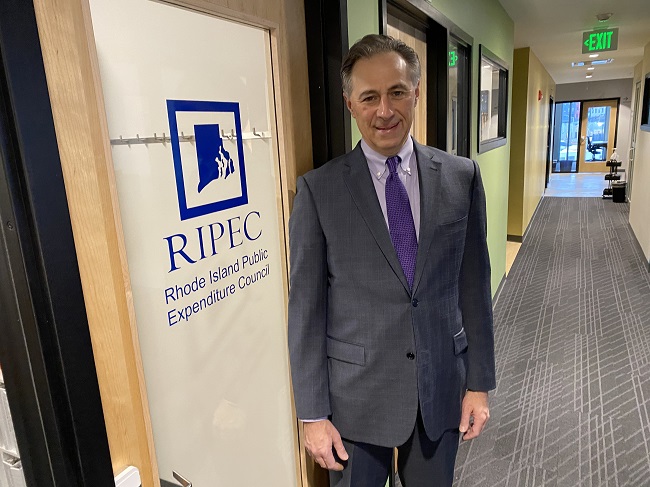
PROVIDENCE – The Rhode Island Public Expenditure Council, a nonprofit public policy research organization, on Wednesday published its analysis of Gov. Daniel J. McKee’s $13.75 billion fiscal 2024 budget proposal and fiscal 2023 amendments.
The message was clear: the rain of federal dollars, an historic outlier resulting from the COVID-19 emergency, are soon coming to an end. And with them the inflated budgets of recent years that are unprecedented in modern times.
While the report praised McKee for dedicating the bulk of the $610 million of remaining federal rescue dollars to one-time expenditures to steer clear of future year funding obligations, and gave positive nods to his tax relief measures, investments in life sciences, and increases to public school funding, among other proposals, the primary theme was one of fiscal restraint in subsequent budget cycles.
RIPEC notes that McKee’s fiscal year 2024 spending plan is a 43.7% jump from fiscal year 2019, driven by the infusion of federal funding connected with the pandemic. While the proposal is a drop from the $14.1 billion in the revised fiscal year 2023 budget, it is “dramatically higher” than the $9.5 billion in fiscal 2019 expenditures.
And the $5.3 billion in state general revenue expenditures are 35.5% percent higher than in 2019.
“The governor’s FY 2024 budget appears to be the last of a series of flush state budgets fueled by enormous allocations of federal pandemic funding and very large general revenue surpluses,” said Michael DiBiase, CEO and president of RIPEC. “It appears that the governor’s proposed FY 2024 budget will be the last of a series of flush budgets fueled by enormous allocations of federal pandemic funding and very large general revenue surpluses.”
The report highlights the economic contraction now predicted by economists. While the state enjoyed an average annual growth rate of 3.5% from 2014 to 2018 and 6.6% from 2019 to 2023, state budget forecasters estimate growth from 2024 to 2028 at what RIPEC called a “constrained” 2.5%.
In addition, the latest Revenue Estimating Conference projects $81.5 million in additional state revenues, a “modest growth “ rate of 1.6%, said RIPEC. The conference also downsized the projected budget surplus by $61 million for the current fiscal year, “based primarily on a sharp reduction of $96.6 million in projected personal income tax revenues.”
Smith Hill legislators will soon be unveiling their own spending plan. Spokesman for House Speaker K. Joseph Shekarchi said on Wednesday the House Finance Committee is expected to release its budget proposal “in the coming days.”
In the meantime, the RIPEC report makes seven recommendations:
- Avoid spending commitments beyond available resources and prepare to curtail the level of spending growth.
- Approve McKee’s proposed creation of a supplemental rainy-day fund and consider further increases.
- Reform the state education funding formula to direct more aid to economically disadvantaged and multilingual students.
- Ensure that a sufficient state match is available to access increased federal infrastructure funding.
- Focus on the health and human services delivery system since spending demands in this area will likely present the most challenging issue for the fiscal 2025 budget.
- Seek to improve the state’s business tax climate, which the Tax foundation has ranked 9th worst in the nation.
- Give “special attention” to future expenditures including a plan to more than double the number of pre-K seats, the high per-patient cost of state hospitals, the sharp increases in the projected cost of the South Quay terminal project in East Providence, and the structural gap between revenues and administrative expenditures in the workers’ compensation fund.
“Policymakers have had a relatively easy time managing expenditures, but the state is now entering a period in which pandemic-related federal funding will be running out and state general revenue growth will be considerably more constrained,” said DiBiase. “Policymakers will need to avoid unsustainable spending commitments and be prepared to curtail the level of spending growth.”
Christopher Allen is a PBN staff writer. You may contact him at Allen@PBN.com.













DiBiase is RIght, now is the time to start cutting expenses and stop buying votes by spending taxpayer funds wastefully.